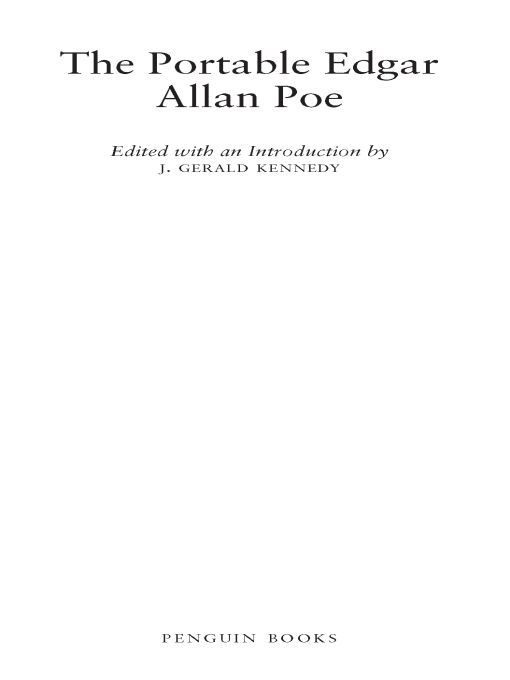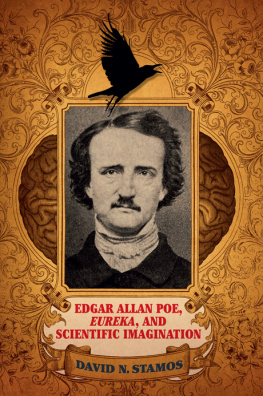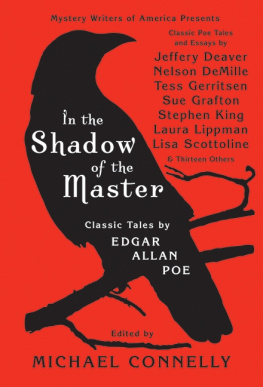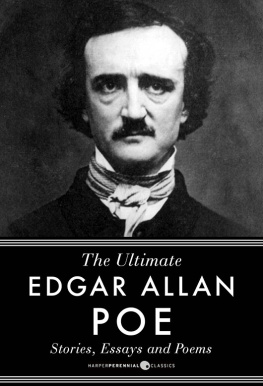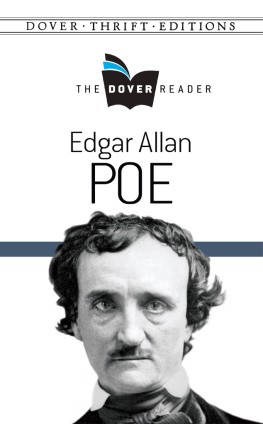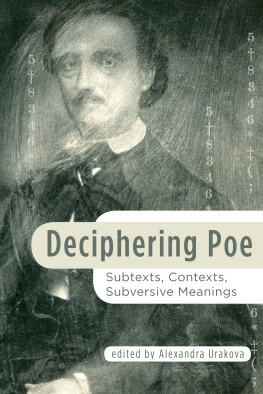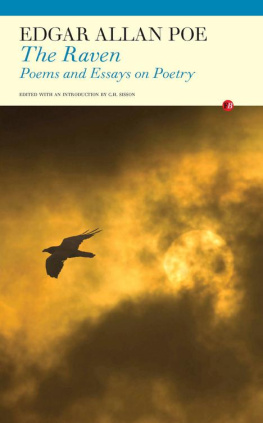Table of Contents
THE PORTABLE EDGAR ALLAN POE
EDGAR ALLAN POE was born in Boston on January 19, 1809, the son of itinerant actors. Orphaned in 1811, he became the ward of John and Frances Allan of Richmond, accompanying them to England in 1815 and then returning in 1820 to Richmond, where he completed his early schooling. In 1826 he attended the University of Virginia, but gambling debts forced his withdrawal, and after a clash with his foster father, Poe left Richmond for Boston. There in 1827 he published his first book of poetry, Tamerlane and Other Poems, and enlisted in the U.S. Army as Edgar A. Perry. After tours of duty in South Carolina and Virginia, he resigned as sergeant-major, and between two later books of poetryAl Aaraaf, Tamerlane, and Minor Poems (1829) and Poems (1831)he briefly attended the U.S. Military Academy. Court-martialed and expelled, he took refuge in Baltimore with his aunt, Maria Clemm, and there began to compose fantastic tales for newspapers and magazines; in 1835 he obtained a position in Richmond at the Southern Literary Messenger. Perhaps already secretly wedded to his thirteen-year-old cousin, Virginia Clemm, he married her publicly in 1836. At the Messenger Poe gained notoriety by writing savage reviews, but he also raised the journals literary quality and enhanced both its circulation and reputation. In 1837, however, economic hard times and alcoholic lapses cost Poe his job; he moved to New York, where he completed a novel, The Narrative of Arthur Gordon Pym, published in 1838. By then, Poe had relocated to Philadelphia, where he wrote Ligeia as well as The Fall of the House of Usher and William Wilson. During successive editorial stints at Burtons Gentlemans Magazine and Grahams Magazine, Poe developed plans to establish a high-quality monthly periodical. He also published his first book, a volume titled Tales of the Grotesque and Arabesque (1840), and later produced the first modern detective story, The Murders in the Rue Morgue, as well as the prize-winning cryptographic tale, The Gold-Bug. In 1842 his wife suffered a hemorrhage that marked the onset of tuberculosis. Poe returned to New York in 1844 and reached the peak of his productivity, publishing such tales as The Premature Burial and The Purloined Letter. He gained fame in 1845 with his poem The Raven, and that year also saw the publication of two books: Tales and The Raven and Other Poems. But the weekly literary newspaper he had managed to acquire, The Broadway Review, collapsed at the beginning of 1846. Moving to nearby Fordham, Poe continued to write and to care for Virginia until her untimely death in 1847. In his final years, he composed the sweeping, cosmological prose-poem, Eureka (1848), as well as some of his most renowned poetry, including The Bells, Eldorado, and Annabel Lee. After a ruinous bout of election-day drinking, Edgar Allan Poe died in Baltimore on October 7, 1849.
J. GERALD KENNEDY is William A. Read Professor of English at Louisiana State University and a past president of the Poe Studies Association. He earned his doctoral degree at Duke University, where he was elected to Phi Beta Kappa. His books on Poe include Poe, Death, and the Life of Writing (1987) and The Narrative of Arthur Gordon Pym and the Abyss of Interpretation (1995), as well as two edited collections of essays, A Historical Guide to Edgar Allan Poe (2001) and (with Liliane Weissberg) Romancing the Shadow: Poe and Race (2001). In an early book titled The Astonished Traveler: William Darby, Frontier Traveler and Man of Letters (1981), he reconstructed the career of a prolific antebellum geographer and magazinist. Kennedys work on literary modernism includes Imagining Paris: Exile, Writing, and American Identity (1993) and two edited collections, Modern American Short Story Sequences (1995) and (with Jackson R. Bryer) French Connections: Hemingway and Fitzgerald Abroad (1998). He has served many years on the board of the Ernest Hemingway Foundation. Fellowships from the John Simon Guggenheim Foundation, the National Endowment for the Humanities, and the Louisiana Board of Regents have supported work on an expansive study of national destiny and the cultural conflicts that vitiated American literary nation-building, 1820-1850.
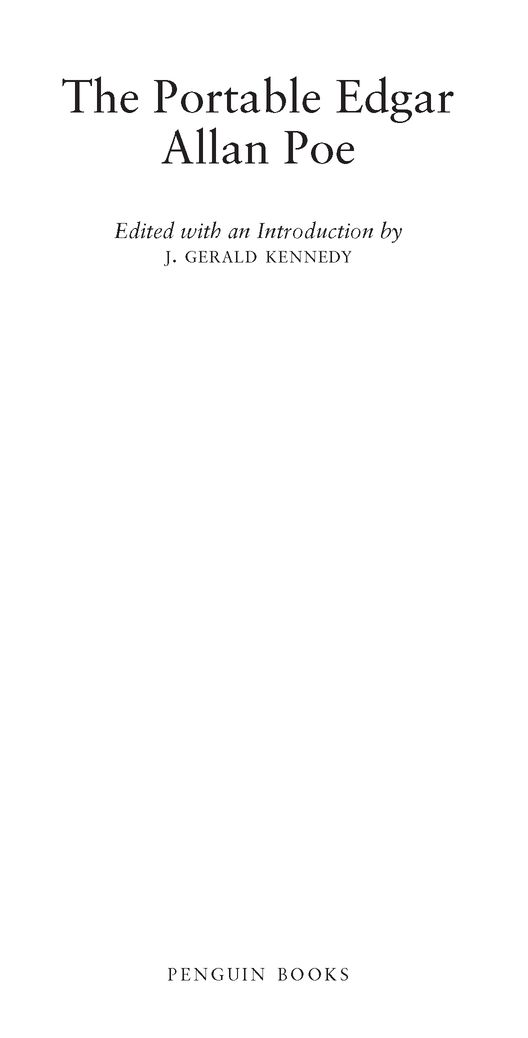
Introduction
An alien presence in the first generation of professional American authors, Edgar Allan Poe has fascinated generations of readers around the world while perplexing scholars. From the outset he overturned expectations and flouted conventions. The self-proclaimed need to conquer or diesucceed or be disgraced drove Poe to stretch the boundaries of literary representation. When an editor scolded him in 1835 for the disgusting particulars of an early tale, he coolly enumerated the narrative modes he meant to exploit: the ludicrous heightened into the grotesque; the fearful colored into the horrible; the witty exaggerated into the burlesque; the singular wrought out into the strange and mystical. Committing himself to an extreme art sometimes approaching the very verge of bad taste, Poe aimed to achieve celebrity by shocking the public. To be appreciated, you must be read, he insisted, justifying his tactics. While magazines and gift books purveyed sentimentalized images of death, he conjured subversive scenes of dissolution, dismemberment, and decomposition; his poems and tales defined a twilight zone of primal anxiety and endless melancholy. Dismissing a charge that he emulated the German romantics, Poe hinted at the origins of his own creativity when he observed in 1840 that terror is not of Germany, but of the soul. He rejected the assurance of contemporary religionists, making the condition of dreadand a corollary yearning for transcendencehis trademark as a writer. But he also mocked both Gothic terror and Transcendentalism.
Poes paradoxical trafficking in corporeality and spirituality, in vulgarity and sublimity, in banal humor and mortal seriousness may have something to do with his wide appeal as well as his resistance to facile categorization. His compulsion to astonish or perplex led him to overturn familiar assumptions, as when his detective C. Auguste Dupin observes: Truth is not always in a well. In fact, as regards the more important knowledge, I do believe that she is invariably superficial. Reversing the conventional logic of surface-depth relations, Poe suggests that the deepest truths are neither remote nor esoteric but instead obscured only by their immediacy. He vaunted his skill as a cryptographer and celebrated mental analysis in tales of ratiocination, yet he also parodied the investigative impulse andin his only novel, The Narrative of Arthur Gordon Pymcaricatured scientific observation as self-delusion.
He cloaked his uncertainties about the fate of the soul in farces that travestied human mortality, representing characters who survive hangings, beheadings, and premature burials. He developed a theory of fiction in which effect trumps moral enlightenmenthe called didacticism a heresyand contrived nightmarish tales of sensation. But he also satirized literary sensationalism and devised moral fables about pride and profligacy. Poe famously declared the death of a beautiful woman to be the most poetical topic in the world, yet in several tales he made her demise the horrifying soul of the plot. His penchant for mystification, for constructing hoaxes to dupe the reading public and assert his intellectual superiority perhaps compensated for grinding poverty and social obscurity.

